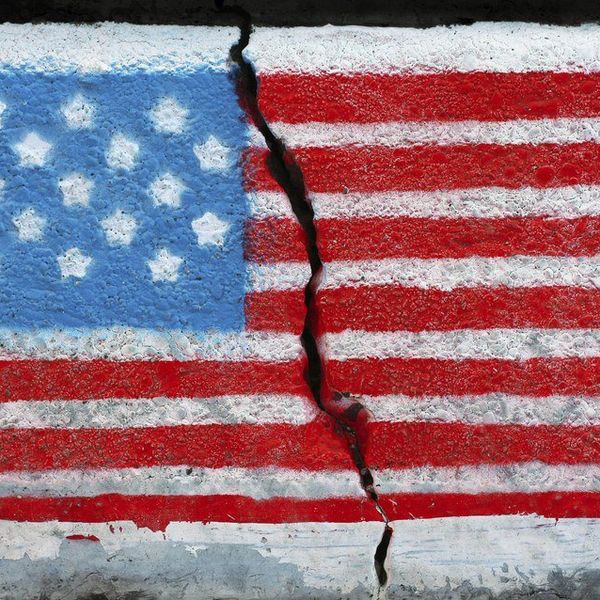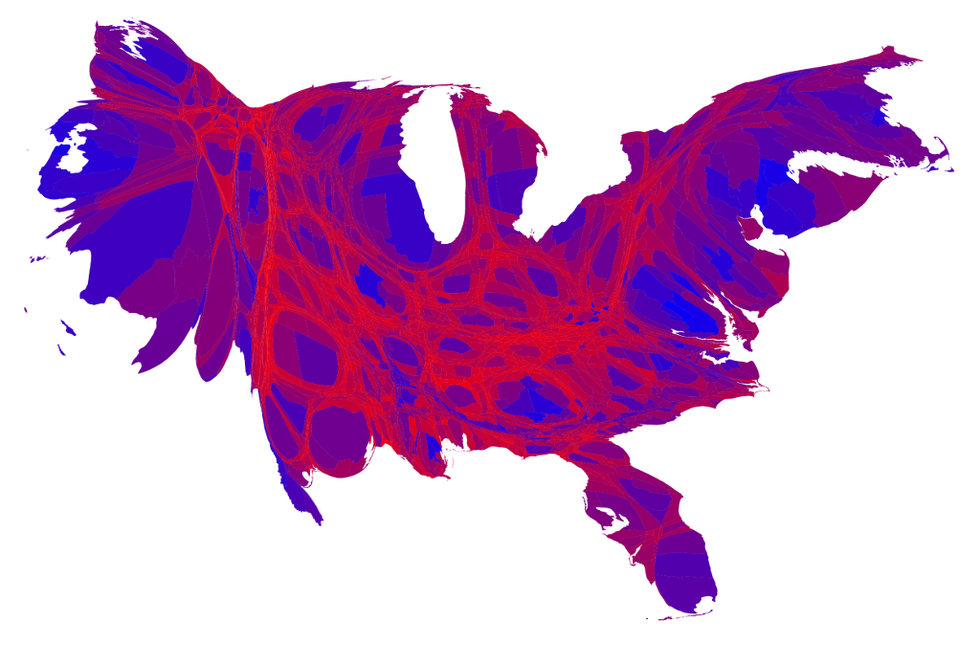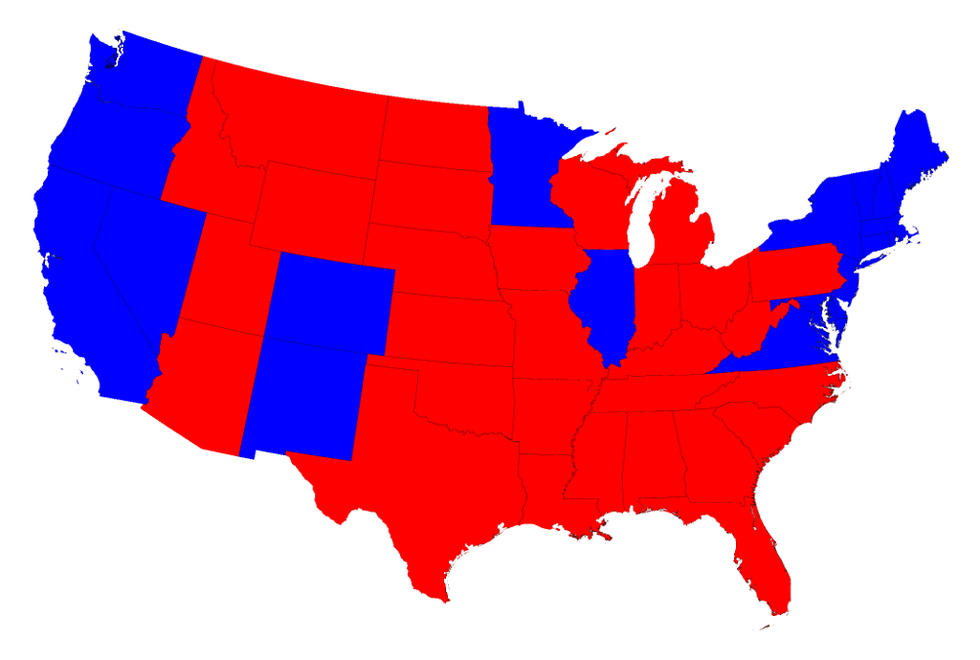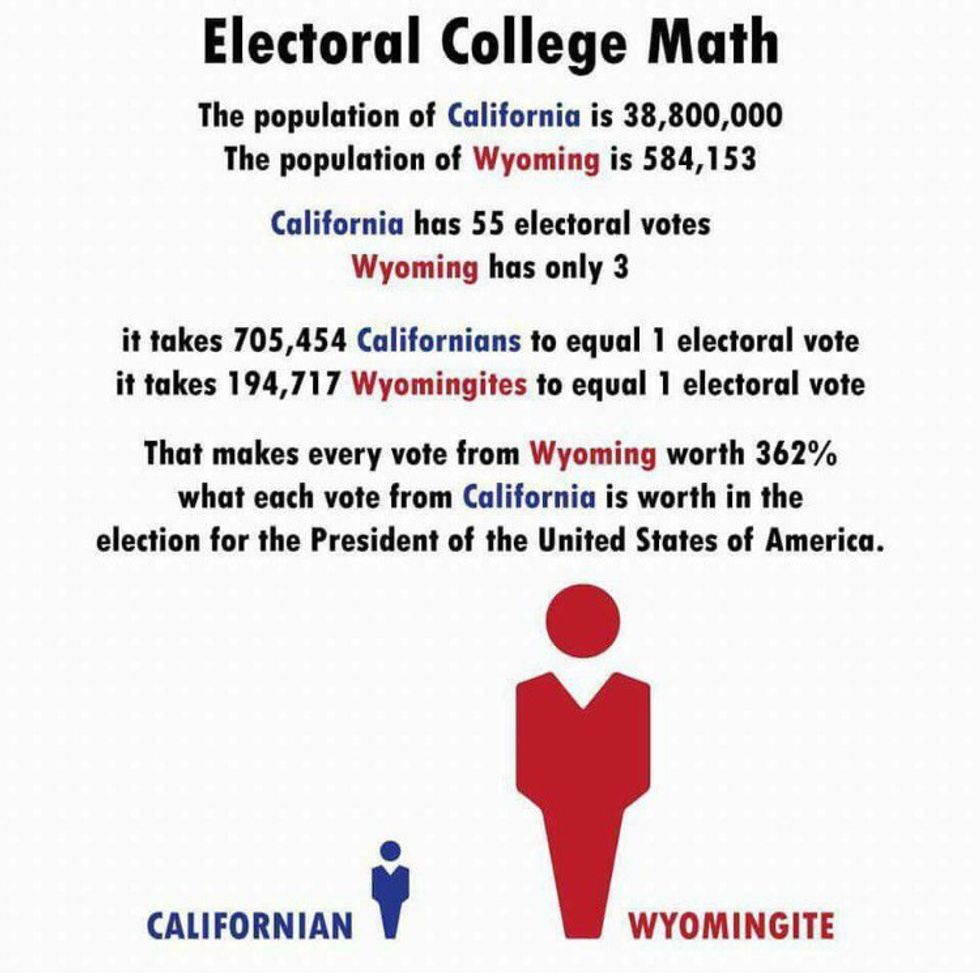Take a look at this picture:
It is a map of the United States, adjusted in color and proportion to match the votes cast by American citizens during the 2016 Presidential election. You may notice that it looks slightly different than the comparatively simplistic map below:
The first map shows how people voted. The second map shows how states voted, after being filtered through an arbitrary process known as the Electoral College.
On November 8, Hillary Clinton won the votes from over a million and a half more people than Donald Trump in the 2016 Presidential election. She then lost the race.
While Clinton won the popular vote, she lost the Electoral College. The Electoral College assigns one vote to states for every representative in Congress that they have. Since each state has two Senators in addition to their representatives in the House of Representatives, the voting power of citizens from smaller states is artificially inflated. In the popular vote, the aggregate of all citizens’ votes, no citizen’s vote has more power than another’s – unlike in the Electoral College, where a Wyoming citizen’s vote is worth almost 4 Californian votes:
The popular vote is inherently fairer to people than the Electoral College because every person's vote is weighed equally. Every state's vote is not weighed equally, but that is not the case in the Electoral College either — giving 38.3 million Californians and 0.63 million Vermont citizens the exact same electoral power would be even more clearly absurd. The Electoral College then has the worst of both worlds: it cannot say that it is fair to citizens or that it is fair to states.
Also, people can be clearly distinguished, defined, communicated with and valued outside of abstract political contexts. States, which are simply useful social constructs, cannot.
Focusing on states as the Electoral College does has the additional problem of completely ignoring the 4 million citizens living in U.S. non-state territories. Citizens of Puerto Rico, Guam, the U.S. Virgin Islands, Northern Mariana Islands, American Samoa, and the U.S. Minor Outlying Islands outnumber the populations of Wyoming, Vermont, North Dakota, Alaska and South Dakota combined. Yet they have no voice in electing their President, because the Electoral College only cares about states (and about Washington D.C., as of 1968). Anyone who approves of the Electoral College in its current form also approves of more than 4 million American citizens having no right to vote for their President.
In the Electoral College, citizens do not actually vote for the candidates that they think they are voting for. Instead, they vote for "electors," an unelected select group of political insiders who cast the real votes to decide the Presidency.
The framers of the Constitution hoped that the electors would be independent, well-informed about national policy and potential leaders. But these days electors are often chosen by party slate and not even identified to voters as individuals; independent judgment is actually disqualifying.
Names of electors are not on citizens' ballots, which list the names of the people running for office. But a vote intended for some politician must go to some unknown elector first and then to that politician. Why not cut out the middle man?
Electors are expected to follow the popular vote for their state, but can decide to vote otherwise. Those who do, called "faithless electors," casually invalidate the thousands of voters who they were supposed to represent. This is not merely a theoretical possibility — 157 electoral votes in American history have been "faithless."
In the Electoral College, the only states where individual voters have an impact are "swing states," arbitrarily "chosen" because the voters in those states roughly balance out political-party-wise. Presidential candidates tend to ignore the others.
The Electoral College does not make candidates pay attention to small states, even though it gives their citizens arbitrary power. For instance, two-thirds of the campaigning for the 2016 election was spent in only six states — all of which were among the top twelve most populated in the nation.
Arguably, the worst part of the Electoral College is its "winner-take-all" rule, followed by all but two U.S. states. If 50.001% of a state's population votes for Candidate A, then Candidate A wins all of that state's electoral votes. The 49.999% of that state's citizens who voted for Candidate B will have wasted their votes entirely, because their votes do not affect the final electoral vote count. This may be most noticeable in swing states, but it is a problem for all of the others as well.
If you are a Democrat in Texas or a Republican in Oregon, or any other political minority, then I want to apologize to you on behalf of every American — all the way back to the Founding Fathers — that your vote has never influenced a Presidential election. If we abolish the Electoral College, then in 2020 your vote could make a difference for the first time.
Switching to an election by popular vote will probably be uncontroversial, considering that 63% of Americans want to do away with the Electoral College while only 29% want to keep it. People are unhappy when their votes don't count — what a shocker!
I mentioned last week that one of the "benefits" of Trump's election is that we don't have to hear his supporters rant about the election being "rigged." For clarification, I am not trying to say here that the election was intentionally rigged against my political party. Rather, our voting system has been unintentionally yet unsatisfactorily undemocratic and unfair for a long time.
The saddest part of this whole mess is that the Electoral College was "created to stop demagogues like Trump," according to Alexander Hamilton. As we can see, it is doing a wonderful job at that. Maybe a few of the electors can restore Americans' faith in the system by being faithless to their state's popular vote and faithful to the whole country's popular vote instead.
There are plenty of online petitions calling to abolish the Electoral College, including Change.org (with 65,740 signatures as of November 20), Daily Kos (494,433), The Nation (not listed), MoveOn.org (563,358), and ActionSprout (783,609).
Petition2Congress has sent 1,326 messages to Capitol Hill with the same request. A handful of petitions were posted on WhiteHouse.gov after the election, although they have not gained traction yet: they have 72, 17, 15, and 6 signatures respectively as of November 20. Full disclosure: I signed all of those petitions.
Senator Barbara Boxer introduced a bill to get rid of the Electoral College last Tuesday. She described the system as "an outdated, undemocratic system that does not reflect our modern society," saying that "it needs to change immediately." As it turns out, she is completely right.
While 700 previous attempts failed to abolish the Electoral College and Boxer's will probably fail too, there is a much more realistic path to eliminate the Electoral College:
The National Popular Vote Interstate Compact is an agreement among several U.S. states and the District of Columbia to award all their respective electoral votes to whichever presidential candidate wins the overall popular vote ... it will come into effect only when it will guarantee that outcome. As of 2016, it has been joined by ten states and the District of Columbia; their 165 combined electoral votes amount to 30.7% of the total Electoral College vote, and 61.1% of the 270 votes needed for it to have legal force.
Whichever method is used, I hope for the sake of every American that this arbitrary, antiquated, and altogether awful system is annihilated.
Next week, I will point out the holes in the various arguments that Electoral College proponents have used to support it. If you want more information on the subject now, though, then you can check out some of the following resources:
Forbes: "It's Time To Abolish The Electoral College"
College Humor: "Why The Electoral College Ruins Democracy"
Minn Post: "10 reasons why the Electoral College is a problem"
CGP Grey's videos on the subject:
























